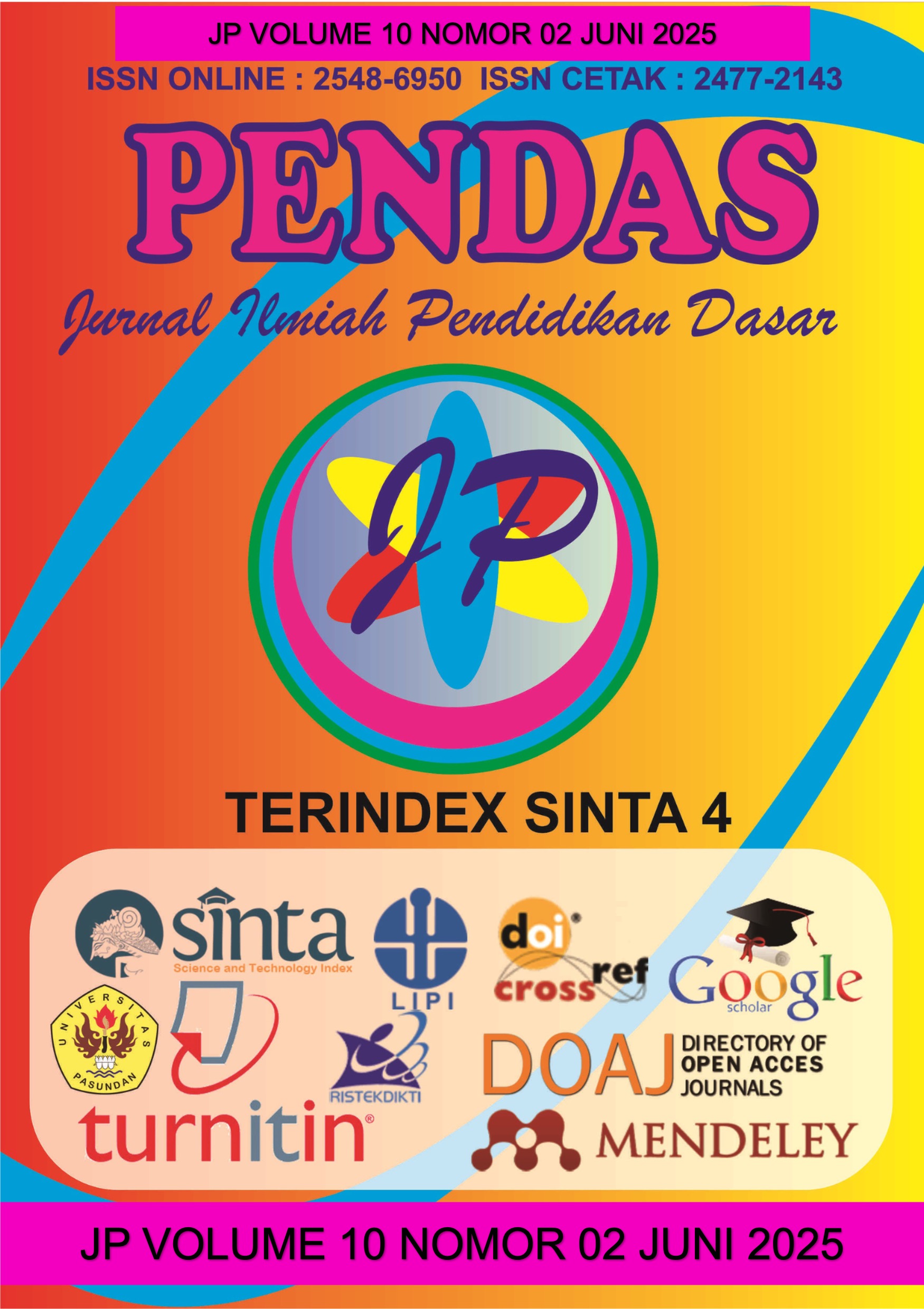PENGARUH MODEL PROBLEM BASED LEARNING BERBANTUAN GAME WORDWALL TERHADAP KEMAMPUAN MENGANALISIS SISWA PADA MATA PELAJARAN IPAS KELAS IV SDN SIDOTOPO I/48
DOI:
https://doi.org/10.23969/jp.v10i02.25093Keywords:
problem based learning model, wordwall game, ability to analyzeAbstract
The purpose of this study is to determine the effect of the Problem-Based Learning (PBL) model supported by the Wordwall game on the analytical skills of fourth-grade students in the IPAS subject at SDN Sidotopo I/48. This research follows a quantitative experimental design using a one-group pre-test post-test model. The study population consists of 30 fourth-grade students at SDN Sidotopo I/48, with a total sampling technique applied, meaning all 30 students were included as participants. Data collection was carried out using tests in the form of pre-tests and post-tests. The data analysis methods included normality tests, homogeneity tests, and t-tests. The normality test results, based on the Kolmogorov-Smirnov method, showed significance values of 0.182 for the pre-test and 0.056 for the post-test. The homogeneity test resulted in a value of 0.899, which indicates that the data is homogeneous as it is greater than 0.05. Meanwhile, the hypothesis test using the paired sample t-test yielded a significance value of 0.000, which is less than 0.05. This leads to the rejection of the null hypothesis (H0) and acceptance of the alternative hypothesis (H1). Therefore, it can be concluded that there is a significant impact of the Problem-Based Learning model assisted by the Wordwall game on students' analytical skills in the IPAS subject for fourth-grade students at SDN Sidotopo I/48.
Downloads
References
Adipat, S., Laksana, K., Busayanon, K., Ausawasowan, A., & Adipat, B. (2021). Engaging Students in the Learning Process with Game-Based Learning: The Fundamental Concepts. International Journal of Technology in Education, 4(3), 542–552. https://doi.org/10.46328/ijte.169
Dewina, S., Suganda, O., Widiantie, R., Kuningan, U., Kuningan, U., & Menganalisis, K. (2017). Pengaruh model pembelajaran problem based learning ( PBL ) terhadap kemampuan menganalisis dan keterampilan. Jurnal Tadris IPA Indonesia, 9(2), 46–54. https://doi.org/10.25134/quagga.v9i02.748.Abstrak
Fitriani, A., Zubaidah, S., Susilo, H., & Al Muhdhar, M. H. I. (2020). PBLPOE: A learning model to enhance students’ critical thinking skills and scientific attitudes. International Journal of Instruction, 13(2), 89–106. https://doi.org/10.29333/iji.2020.1327a
Hakim, L., & Rahmawati, D. (2022). Penerapan Model Pembelajaran Berbasis Masalah dengan Bantuan Media Interaktif untuk Meningkatkan Hasil Belajar Siswa. Urnal Teknologi Pendidikan, 24(1), 89–101.
Maulana, R., Susilaningsih, E., & Subali, B. (2022). Implementation of Problem-Based Learning Model to Enhance Critical Thinking Skills on Force Material in Fourth Grade Elementary School. Journal of Primary Education, 11(2), 274–286.
Ponidi, N. A. K. D., Trisnawati, D. P., Erliza Septia Nagara, M. K., Dwi Puastuti, W. A., & Leni Anggraeni, B. H. S. (2021). Model pembelajaran inovatif dan efektif. Penerbit Adab.
Shofiya, N., & Wulandari, F. E. (2018). penelitian pendidikan IPA. Model Problem Besed Learning, 03(1), 34-35.
Sugiyono. (2019). Metode Penelitian Kuantitatif, Kualitatif, dan R&D. Bandung: Alfabeta.
Wijaya, J. (2017). Pengaruh Model Pembelajaran Problem Based Learning Berbantuan Aplikasi Wordwall Terhadap Kemampuan Berpikir Kritis dan Berpikir Kreatif Peserta Didik. Jurnal Ilmiah Mahasiswa (JIM) Pendidikan Fisika, 2(3), 283–287. http://jim.usk.ac.id/pendidikan-fisika/article/view/4979
Yaki, A. A. (2022). Fostering Critical Thinking Skills Using Integrated STEM Approach among Secondary School Biology Students. European Journal of STEM Education, 7(1), 06. https://doi.org/10.20897/ejsteme/12481
Downloads
Published
Issue
Section
License
Copyright (c) 2025 Pendas : Jurnal Ilmiah Pendidikan Dasar

This work is licensed under a Creative Commons Attribution 4.0 International License.














































